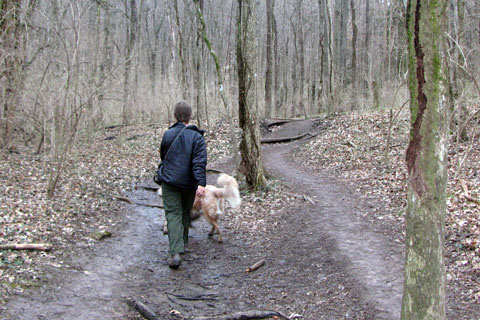| 353 | Trail Closed | 2011-02-24 |

The trail has grown wider (to the right) by hikers avoiding the mud of the main trail
In Idaho, a trail closing made the news. The trail went to the popular Table Rock and the trail manager closed the trail because of misuse. Hikers and mountain bikers had used the trail in wet conditions. Avoiding the muddy trails, the hikers and bikers began using the area to the side of the trails making an even greater impact. Evidently the trail was a mess.
"BOISE, ID - The signs are up: "Trail Closed." For the first time ever, some popular hiking and biking trails around Table Rock are shut down because of misuse.
People have been using them when they're muddy, even stepping off the trails to walk on drier ground. Trail managers say because of that, the trails are badly damaged. There are spots with deep foot prints and bike tracks, that make the trails more difficult to use.
They say until things dry out, they have no choice but to voluntarily close the trails to protect them from long-term, irreparable damage.
"If we allow this to continue, our trails that should be about two feet wide will be six to eight feet wide, explains trail program coordinator David Gordon. "If we want people 30 to 40 years from now to have the same experience we have, we need to get people to use them responsibly under these conditions." "
So who is to blame...
Trail users should walk or ride on the tread of the path regardless if it is muddy or not. If a trail has a history of being muddy, it is not a bad idea to avoid the trail after a rain. The sensible volunteer closing by the users keeps the trail managers from having to take action. The trail users cause the damage.
The trail managers are responsible for constructing, re-building, and maintaining trails. A well constructed trail keeps hikers and bikers on the trail by design and drains well. The trail manager allowed the damage, probably by default - no resources - then, closed the trail to avoid further damage.
All citizens are responsible for ensuring that the trails are usable. By voicing concerns to the land managers, citizens shape the trails of the future.
Of course, if the citizens tell the land managers they want the trail fixed, the land manager will tell the trail manager to fix the trail, and the trail manager will need time and money from the users.
If you use trails, take pride in and care for the trails as a special resource.
Happy trails.
